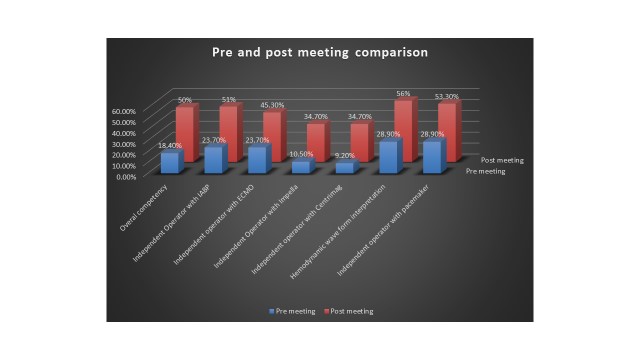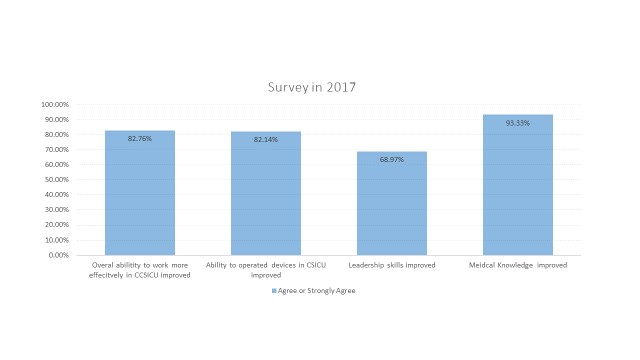Montefiore Medical Center
Bronx, NY
Program Director: Adam Keene
Program Type: Critical Care
Abstract Authors: Marjan Rahmanian, MD; Lewis Eisen, MD; Adam Keene, MD; Rosemarie Conigliaro, MD; Anthony Carlese, DO
Description of Fellowship Program: Montefiore critical care fellowship is a multidisciplinary critical care fellowship at an academic medical center . It is 2 year program for those finish Internal medicine or Emergency residency, or one year program for those graduate form cardiology, nephrology, Infectious, or Anesthesia fellowship.
Abstract
Introduction
Critical care fellows graduate with an inconsistent knowledge of cardiovascular disease and an inadequate skill set for the management of patients after cardiothoracic surgery with cardiac critical illness. Hill et al analyzed 134 surveys that were completed by United States critical care fellows. Overall respondents reported lower confidence in managing cardiovascular problems compared with non-cardiovascular disease in the ICU. To overcome this deficiency, we developed a one day cardiothoracic surgical ICU (CSICU) boot camp in 2015 and 2016 with didactic lectures and hands-on skills training.
Method
During the CSICU boot camp, didactic lectures were given in the morning on topics: "Intervention for Coronary Artery Syndrome, Mechanical Cardiac Support in the Acute Setting, Management in the First 24 Hours after Cardiac Surgery, Hemodynamic Waveform Interpretation, Anticoagulation Issues in the CSICU, Ventilator Management in Heart Failure, Temporary pacing in the ICU Setting, Renal Replacement Therapy in the ICU" and in the afternoon participants rotated through 7 different stations " Intra Arterial Balloon Pump, Impella, ECMO, Centrimag, Temporary Pacemaker, Mechanical Ventilator, Pulmonary Arterial Catheter" to gain experience in handling/managing and interpreting different devices in the CSICU. We administered surveys pre and post the meeting. We used a Likert scale with ratings from 1 to 5 (1 being the least confidence and 5 the most) to evaluate participant’s improvement. 76 (81.7%) of participants completed the evaluation form. We looked at grouped scores of 4 and 5 on the Likert scale pre and post our one-day intervention.
Result
A total of 93 persons participated over the 2 years. The participants were critical care fellows (18) 19.35 %, physician assistants (28) 30.1%, critical care attendings(6) 6.45%, the rest (41) 44% were cardiology fellows, anesthesiology and internal medicine residents and ICU nurses. . Overall competency improved from 18.4% to 50% post training, familiarity as an independent operator with IABP (Intra-arterial Balloon Pump) went from 23.7% to 50.7%, with ECMO (Extracorporeal Membrane Oxygenation) from 23.7% to 45.3%, with Impella from10.5% to 34.7%, with Centrimag from 9.2% to 34.7%, with hemodynamic wave form interpretation from 28.9% to 56%, and with pacemaker from 28.9% to 53.3%. Subsequently in 2017 we sent our survey to the same 93 participants to assess their retention of the information learned in the boot camp, and received 30 responses (32.5%). Of those who had participated in a conference like this prior, 68.42% rated this one above average. 82.76% agreed or strongly agreed that taking this course improved their overall ability to work more effectively in the cardiothoracic ICU, 82.14% agreed or strongly agreed that taking this course improved their ability to operate the devices in CSICU, 68.97% were agreed or strongly agreed that taking this course improved the leadership skills and 93.33% were agreed or strongly agreed that taking this course improved their medical knowledge.
Conclusions
Our CSICU Boot camp, which was not resource intensive, was effective and improved the confidence and perceived ability of participants to manage patients after cardiothoracic surgery.





